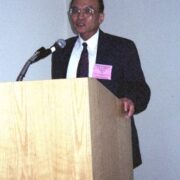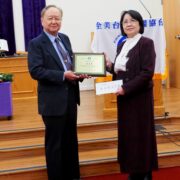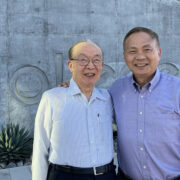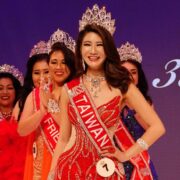我的母親
林淑麗
前言:家母林張簡菊生於一九二一年的台灣,於二〇一九年三月在美國紐澤西辭世。為了方便在追思會的西方朋友的理解,這篇文章原以英文發表。中文版先是由Google翻譯,作者再潤修。生活在「英漢互換」的世界,原是台美人的「主體性」,所以我將兩種表達方式,同時附上,歡迎指正。
母親是一個非常謙虛的人。但是,她有一些值得驕傲的事情。一方面,她為能當藥劑師而感到自豪。其次,她珍惜在台灣高雄大寮鄉張簡家族的一些成長經歷。讓我解釋一下:
我家四個孩子小時候,總是看她身兼數職,既是父親診所的藥劑師,又是一個家庭的總經理和兒童教育家。她全力以赴的履行這些無償的、艱鉅的任務。對我們來說,這就像舉頭望見的天空和我們呼吸的空氣一樣自然。我們成年並獨立後,父母移居日本。因他們不想再承受開診所的種種壓力,故父親接受了日本茨城縣地區的一名醫生職位。 幾年後,來到了日本岡山的一所醫院。有一天,醫院有一名藥劑師職位。在了解了母親的專業背景之後,他們很高興地聘請了她。幾年前,舍妹淑華在台灣老家辛勤整理、保存家人的歷史性資料,因而我們在海外有機會看到日本政府於一九八四年頒發予她的藥師執照的電子檔。第二次世界大戰期間,她於1943年畢業於昭和女子藥學專門學校,最終在六十三歲時得以領取藥師的一份薪水。
舍妹淑華在老家儲藏室裡發現了一九四零年代,母親在日本攻藥學學士時的植物學筆記本。葉子和植物的花朵結構、細胞組織的切面圖,一頁又一頁的在我們的眼前栩栩如生的呈現。有時她會加個註解,例如:這植物可作利尿劑。 頁面上還蓋著老師過目後的印章。將近八十年前的手跡,彷彿預言了她在花園中終生不懈的栽培花種的生涯。
1986年從日本醫院退休後,我的父母開始半年在台灣、半年在美國的生活。父親1994年去世以來,母親在台灣的時間越來越少。 同時,她對美國文化的興趣變得更加強烈。 除了參加「英語作為第二語言」的課程之外,她還養成了觀看美國職棒聯盟比賽的嗜好。這位亞洲老人家頻繁出現在紐約的Shea體育場開始引起人們的注意。 地方電台希望派新聞記者作現場拍攝,由她的英文老師打電話傳達這個要求;一向 低調的她毫不猶豫地婉拒了。
她生活在異國他鄉,獨處的時間很長,但她從未唉聲歎氣,總是找機會將自己的知識運用到房屋周圍事物上。例如製定有效劑量的硼酸混合物來控製家內的昆蟲;為孫女提供腳疣的食物療法。為了節省地球資源,她把用過的紙巾依其「再利用」的合適性進行分類。在臨終脆弱的狀態下,當我們餵食液態食物時,她會試圖抹去嘴角些微的溢出物。
日常生活中的一些事偶而觸發她在大寮的張簡家成長的記憶。最近她才跟我描述當年家中保存羊肉的詳細配方和過程。張簡家族從事農業和製糖,因經營有方而逐漸興旺起來。從小我們就聽説外祖父是日本統治時期大寮村的村長。因他贏得了村民和僱用的工人的尊敬,所以日本政府信任他。自從一九四零年代以來,張簡的姓氏在台灣南部廣為人知,因為家族栽培了很多的醫生。那個時代女孩受教育不受重視,可是外祖父讓女兒們依照個人的能力和意願一路深造。母親將火把帶到了我們這一代,她一向努力支持女兒們在家庭中的地位。
二零一二年一月,在參加舍妹的二兒婚禮後不久,我獨自在高雄市漫步,來到歷史博物館前,注意到正好有大寮張簡家族史的展覽。 當母親跟家人一起,看到家庭照片和故事成為公眾討論的一部分,她該是多麼高興。 地方史被忽視了數百年之後,我們很欣慰地看到它受到重視,大家有救贖的感覺。
我們家人都有一份熱愛台灣的 心。此時此刻,我的女兒斯蒂芬妮和她的丈夫正在台灣東海岸的太魯閣國家公園度過第二個夜晚。他們在母親病情惡化之前已經訂下這旅程,斯蒂芬妮臨走前特別來看了她老人家。我們現在還沒有告訴他們這個壞消息,僅要求斯蒂芬妮寄來她的懷念,以備不時之需。
以下是她的紀念短文:
當Ama晉入九十多歲時,我開始在家庭聚會上密切地觀察她,以保留對一切細節的記憶,例如:她手指上的精緻指環,臉孔的輪廓,細心照顧盆栽和花卉的方式;我看著她用茶匙嚐自製的照燒醬的味道,若是恰到好處,就可以作下一階段的烹調了。我常要求與她一起作自拍照,很感謝她能出席我的婚禮。她經常問起我丈夫亞歷山大。他稱她為凝聚大家庭的中心人物。Ama,我會很想念您的。
如今母親已經與父親團聚了,但願他們生活在天堂般的祥和中。我們將永遠懷著深深的謝意記住她,感謝她為我們樹立的榜樣以及給予我們的無條件的愛。
My Mother
Shwu Lih Lin
Mother is a very modest person. However, there are things she took pride in, and rightly so. For one, she was proud to be educated as a pharmacist. Secondly, she valued the experiences of growing up in the Chang-Chien family of Daliao, now part of the Kaohsiung City, Taiwan. Let me explain:
While the four children of hers grew up, she always wore several hats in her waking hours as a child educator, household manager, and pharmacist for my father’s clinic; all are un-paid, demanding tasks. To us, this is as natural as the sky above, and the air we breathe. After we reached adulthood and became independent, my parents relocated to Japan. No longer up to the stress of running a clinic, my father accepted a physician’s position in a rural area of Ibaraki, Japan. Several years later, they ended up in Okayama. One day, a pharmacist position became available in the hospital. After learning about her professional background, they gladly offered her the job. Only recently, through the diligent document preservation work of my sister Suhua, the photo of her license issued in 1984 by the Japanese government became available to us. Graduated from Showa Women’s Pharmacy College in 1943, during WWII, she finally worked and got paid as a pharmacist at the age of 63.
Another document my sister Suhua painstakingly secured in our family storage room in Fangshan is the botany class notebook taken in the 1940s, when she studied pharmacy in Japan. Drawing after drawing of leaves and flower structure of plants all came alive in front of our eyes. It was like a metaphor, foretelling her lifelong tireless work in the family garden.
After the retirement from the hospital in Japan in 1986, my parents started to divide their time between Taiwan and United States. Since my father’s passing in 1994, mother spent much less time in Taiwan. Meanwhile, her adoption of American culture was making good progress. In addition to attending “English as a Second Language classes,” she developed a hobby of watching American major league baseball games. This Asian Grandma’s frequent appearance at the Shea Stadium in New York was not gone unnoticed. One day, her teacher at the English class called to convey request from a radio station for reporter to cover her attendance in the game. She avoided the publicity without any hesitation.
Living in a foreign country and often spent time alone, she never complained,. Instead, she found ways to apply her knowledge in things around the house, such as formulating an effective dosage of boric acid based mixture for controlling the household insects; advising granddaughter about curing wort by dietary supplement. To conserve resources, she sorted used paper towels according to the suitability for miscellaneous reuse. In her final frail state, she would attempt to wipe off the tiny spills while we fed her liquid food.
She shared stories of growing up in the Chang-Chien household in Daliao from time to time, when the occasion happened to bring her memory alive. Only recently, she described to me the detailed recipe and process of preserving lamb meat in the household. The family had thrived from smart farming and sugar production. Since childhood, we learned that her father was a mayor of the village of Daliao during the period of Japanese rule. He earned the respect of fellow villagers and hired workers. So the Japanese governments trusted himj. The Chang-Chien last name became well-known in Southern Taiwan, as a result of the many medical doctors the family produced since the 1940s. At a time when education of girls was only secondary, my grandfather let daughters advance as far as their ability and desire took them. My mother carried the torch along to our generation, trying hard to support her daughters’ standing in the family.
In January, 2012, shortly after the wedding of my sister’s second son, I was strolling alone in the city of Kaohsiung and noticed, in front of the Kaohiung Historic Museum, an exhibition about the Chang-Chien family in Daliao. What a joy my mother must have to see family photos and stories becoming part of public discussions. There was a sense of redemption among us in witnessing local history being emphasized after centuries of neglect.
Love for Taiwan runs in our family. At this moment, my daughter Stephanie and her husband are spending their second night in Taroko Gorge National Park in the East Coast of Taiwan. They booked the trip way before my Mom’s condition deteriorated. Stephanie made a special effort to visit Grandma before departure. We haven’t told them the bad news yet. I simply asked Stephanie to express their thoughts in case something happened.
Here is her message:
When she reached her 90s, I started observing her closely at family gathering to preserve details in my memory: delicate rings on her fingers, her facial bone structure, the way she would tend to her potted plants and flowers, how she took a teaspoon taste of home-made teriyaki sauce to assess its readiness for the next phase of dish preparation. I made a point to take selfies of us together. I am so grateful she was present at my wedding. She often asked about Alex, my husband. He referred to her as a central, unifying force in our family. A-ma, I will miss you.
Now that you are united with Father, may you live in heavenly peace. We would always remember you with deep gratitude, for the examples you set for us, and the unconditional love you gave to us.
Mother attended granddaughter’s wedding in 2018

Source from Shwu Lih Lin
Posted in 01/2020





